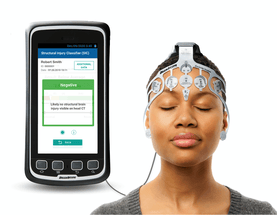Injured your head, now what?
BrainScope is an FDA cleared medical device that is used to assess mild traumatic brain injuries (mTBIs)—like a brain bleed or concussion
Today, when most people hit their head they go to an emergency room to be evaluated. That’s because the only way a doctor could confidently rule out a brain bleed was with advanced medical imaging like a CT scan—that is until now.
BrainScope is a pioneer in the use of artificial intelligence (AI) and machine learning to identify profiles which can provide your doctor with objective information about the likelihood of a brain bleed, aiding in ruling out the need for a CT scan. At the same time, BrainScope helps your doctor assess whether you have a concussion and how severe it may be—head CT scans do not detect concussions.

Brain injuries are not always easy to detect and can occur under a number of circumstances such as a fall, contact sports, or a car accident.
IMPORTANT: An injured person can look and feel fine. You should seek immediate medical attention if you experience:
When in doubt, get prompt medical attention!
What is a traumatic brain injury?
A traumatic brain injury is commonly defined as a blow or jolt to the head or an acceleration/deceleration movement of the head that disrupts the function of the brain.
Mild traumatic brain injury, including concussion, is the least severe and the most challenging to diagnose as there may be little or no visible signs of injury and concussion cannot be seen with CT imaging.
Concussions are usually not life-threatening and may not even result in a loss of consciousness. Most people fully recover from a concussion within a few days or weeks, but in some, symptoms can persist for months or longer, especially when not rapidly diagnosed.

How does BrainScope help?

Adult assessment
BrainScope Structural Injury Classifier (SIC) assesses the likelihood of a brain bleed at time of injury.
Pediatric/young adult assessment
BrainScope Concussion Index (CI) helps in the initial evaluation of concussion for individuals ages 13-25 years.
IMPORTANT: We are unable to give medical or legal advice. If you have medical concerns or questions, consult your doctor. If you are experiencing a medical emergency, call 911.
Here is what you can expect
.

Before the assessment
The medical professional performing the test will:
-
Ask you some questions about how you’re feeling and how you were injured.
-
Clean and prepare your forehead and earlobes so that the BrainScope device will work properly.
-
Place a disposable plastic band with sensors on your forehead and connect it to the BrainScope device for recording brain electrical activity data.

During the assessment
It will take approximately 5 minutes to collect your brain electrical activity data.
-
Sit in a comfortable position.
-
Close your eyes, relax, and remain still.
-
A medical professional will be with you at all times and will guide you for rapid data collection.

After the assessment
Your doctor may also order a digitized clinical assessment which you will perform on the BrainScope device:
- Hold the device in a horizontal position and respond to the questions, much like a video game.
- Perform each action as quickly and accurately as possible.
- Review the results of your test(s) with your doctor.
FAQs
Who will administer the test?
A doctor must prescribe the BrainScope test. Trained personnel will administer the test.
What is it like to have a BrainScope assessment?
The BrainScope assessment is completely non-invasive, is conducted with a disposable headset that passively records brain electrical activity from the forehead region, much like the EKG recording of the heart signal from the chest. The assessment itself takes under 20 minutes from start to finish.
What additional resources are available to me?
If you or a loved one are in need of resources after sustaining a traumatic brain injury, visit any of these organizations for more information: Brainline.org | Concussion Legacy Foundation | Brain Injury Association of America